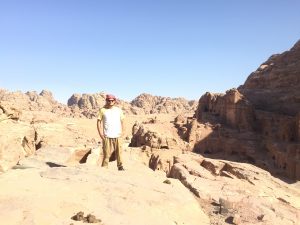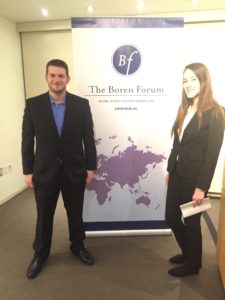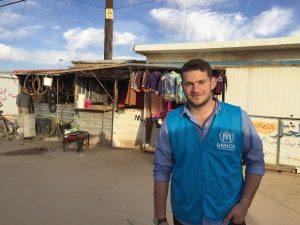“Why the Middle East?” I enjoy it
Excursion to Wadi Musa also known as the “City of Petra”
 I pulled my luggage off the airplane and dragged an overpacked suitcase through the Queen Alia airport unaware that my perceptions of the Middle East would be shattered in under 40 minutes—the distance of the drive from the airport to our host’s apartment in Amman, Jordan. Mile after mile on the highway, small camp fires lined the highway where families and friends gathered together in the cool desert evening to enjoy the weather and the company of those they loved. That was seven years ago. I have made that drive more than a handful of times since and will make it many more times in the future. My decision to invest a substantial portion of my time in studying, researching, and working in the Middle East is the best I have made, yielding countless experiences, opportunities, and moments that have shaped me as a person. Perplexed, people often ask me, “Why the Middle East?” The answer is relatively simple; I enjoy it—the people, the places, the culture, the language, the possibilities, and the opportunities.
I pulled my luggage off the airplane and dragged an overpacked suitcase through the Queen Alia airport unaware that my perceptions of the Middle East would be shattered in under 40 minutes—the distance of the drive from the airport to our host’s apartment in Amman, Jordan. Mile after mile on the highway, small camp fires lined the highway where families and friends gathered together in the cool desert evening to enjoy the weather and the company of those they loved. That was seven years ago. I have made that drive more than a handful of times since and will make it many more times in the future. My decision to invest a substantial portion of my time in studying, researching, and working in the Middle East is the best I have made, yielding countless experiences, opportunities, and moments that have shaped me as a person. Perplexed, people often ask me, “Why the Middle East?” The answer is relatively simple; I enjoy it—the people, the places, the culture, the language, the possibilities, and the opportunities.
I first traveled to the Middle East in 2010 to work on an archaeological dig in the Wadi Arabah in southern Jordan. Those weeks spent in tents in the desert exposed me to a very different way of life and way of thinking. The negative Arab stereotypes proliferated in the United States after the tragedy on September 11, 2001 were wrong. And instead of a western orientalist portrayal of Arabs, I found a community—like my own—that had its own struggles, but was very warm and welcoming. My experience that summer sparked a deeper interest in the region, culture, history, and language. For the first time, I asked myself the question, “Why is the US-Middle East relationship the way it is?”
Contrasting my first trip to Jordan, my subsequent trips in 2011 and 2012 enabled me to conceptualize Jordan’s social, political, and economic struggles during and following the Arab Spring. The first ripples of the Syrian civil war were reaching Jordan as thousands of Syrians fled from the conflict into Jordan. In 2012, I witnessed a refugee attempt suicide in downtown Amman, and it haunted me. Desperate to understand the struggles that brought this refugee to lose hope in life, I returned to work with refugees in Florida and transferred from community college to Florida State University’s Middle East Studies program to learn Arabic. I gained a strong contextual knowledge of the region, a foundation for further study in Arabic through my coursework and research on the Syrian refugee crisis, and the necessary frameworks to both evaluate US-Middle East relations and to understand the events I experienced in Amman. The next step seemed obvious enough—I needed to return to the region.
 The dominos fell into place during my last year at Florida State University. I was awarded a David L. Boren scholarship to Jordan for Arabic. Until this point, my desire to contribute to peacebuilding in the Middle East and my commitment to learning Arabic sustained me through numerous fellowship and scholarship applications. News of winning Boren immediately sparked a new wave of research and applications to organizations and NGOs in Jordan that could provide me an outlet to use my Arabic and work with Syrian refugees in the field. I found this opportunity with the United Nations High Commissioner for Refugees (UNHCR) in Jordan and the Center for Strategic Studies at the University of Jordan. I soon found myself walking the streets of the Za’atari refugee camp in Jordan with Vice-Chancellor of Germany Sigmar Gabriel, writing refugee migration reports for the UNHCR High Commissioner that were shared with world leaders, and, most importantly, working directly with victims of the Syrian conflict. Boren Alumni event in DC
The dominos fell into place during my last year at Florida State University. I was awarded a David L. Boren scholarship to Jordan for Arabic. Until this point, my desire to contribute to peacebuilding in the Middle East and my commitment to learning Arabic sustained me through numerous fellowship and scholarship applications. News of winning Boren immediately sparked a new wave of research and applications to organizations and NGOs in Jordan that could provide me an outlet to use my Arabic and work with Syrian refugees in the field. I found this opportunity with the United Nations High Commissioner for Refugees (UNHCR) in Jordan and the Center for Strategic Studies at the University of Jordan. I soon found myself walking the streets of the Za’atari refugee camp in Jordan with Vice-Chancellor of Germany Sigmar Gabriel, writing refugee migration reports for the UNHCR High Commissioner that were shared with world leaders, and, most importantly, working directly with victims of the Syrian conflict. Boren Alumni event in DC
During that year in Jordan, I invested a significant amount of time trying to understand what my future role in the Middle East could be. Meeting with a variety of senior researchers, policy and security experts, US diplomats, and UN officials in the Middle East enabled me to see a myriad of future career paths related to the Middle East. I quickly learned that there is no specific path to the career I wanted. Some of those I met took more common paths, and others traveled less traditional paths toward the same destination.
Upon returning to the United States and graduating, I embarked on the next season of my life as a Scoville Fellow. This past March, I joined the Protecting Civilians in Conflict program as a Scoville Peace Fellow where I research and write on UN peacekeeping operations, and displacement, civilian protection, and peacebuilding in the Middle East. My interactions with foreign policy professionals and government officials in DC—both as fellow with the Stimson Center and through the Scoville Fellowship—brought me into contact with those I met in the Middle East. Both the Stimson Center and the Scoville Fellowship have enabled me to rekindle those relationships and build new ones with leaders in my field.
Since my first trip to Jordan seven years ago, I have wanted to contribute to solving  protracted crises in the region (particularly Syria), innovating national security policy that benefits both the US and the Middle East, and developing lasting solutions for displaced populations in the Middle East. Now, as a fellow, I am playing an active role through my research with Stimson, publications on US foreign policy in the Middle East, and advocacy on behalf of these issues with members of Congress. In the fall, I will transition back to Jordan and continue my research in the field as a Fulbright Fellow.
protracted crises in the region (particularly Syria), innovating national security policy that benefits both the US and the Middle East, and developing lasting solutions for displaced populations in the Middle East. Now, as a fellow, I am playing an active role through my research with Stimson, publications on US foreign policy in the Middle East, and advocacy on behalf of these issues with members of Congress. In the fall, I will transition back to Jordan and continue my research in the field as a Fulbright Fellow.
UNHCR/Al Jazeera mission to the Za’atari Refugee Camp in Jordan
Jesse Marks is Spring 2017 Scoville Fellow at the Stimson Center. To learn more about the work of the Stimson Center visit their website. His article in The National Interest, Is Donald Trump About to Launch an Operation in Southern Syria? was translated and republished by an Arabic news outlet.
